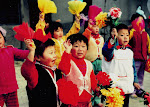 |
| Flying over China |
Protect Your Legal Papers
While most travelers don’t travel with a lot of legal papers, it is
important to protect the legal documents you do have. It is extremely important
to protect your passport, as getting it replaced internationally can be
expensive and time-consuming if a consulate or embassy isn’t handy. (This is
the voice of experience talking here!) Make copies of the passport’s front
page. Put one in your luggage and give others to your traveling companions.
Scan the front page and email it to yourself at an account that can be accessed
anywhere in the world. Having a copy
will make it easier to get a replacement passport and may be the only proof of
who you are should your purse or wallet be stolen. Follow the same procedure
for any current visas in the passport.
Learn the Lingo
Learning a few words in the language of the country you’ll be visiting
makes a good impression on locals. At the very minimum, travelers should know
how to say hello, goodbye, please and thank you. Your pronunciation may not be
spot-on, but the locals will like it that you’re trying. Even if the only word
you speak in Mandarin is “ni hao,” which means hello, the Chinese will
compliment you on your ability to speak Chinese even if you’ve bungled the
Mandarin pronunciation. The Internet makes it easy to learn new languages
through online classes and tutorials. The classes, or at least a few lessons,
are generally free. Whenever I’m planning a visit to China, I always sign up
for a free course to refresh my language skills.
Know Before You Go
China is safer for travelers than other countries, but no country is completely crime-free. At a minimum, take the same precautions to protect yourself that you would at home. Stay in areas that are well lit at night; don’t venture out alone in the middle of the night. Leave expensive jewelry at home as it’s a magnet for muggers. Don’t flash wads of cash around; only keep handy what you’ll need for that day. Wear the rest in a money belt or withdraw from an ATM as you need it; be sure to tell your bank you’re traveling abroad so it won’t deny withdrawals in China. Beware of pickpockets; some are so smooth in parting you and your valuables, you may not know you’ve been victimized until long after the fact.
Travelers who use common sense and take basic precautions are more apt
to have a trouble-free holiday.
Are you going to China?
If you're planning trip to China, check out my website, Cheryl's China, for tips and recommendations. Please feel free to email me if you have any questions about travel in China.




